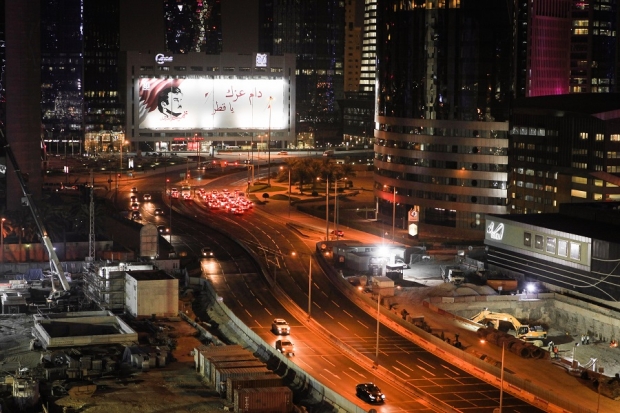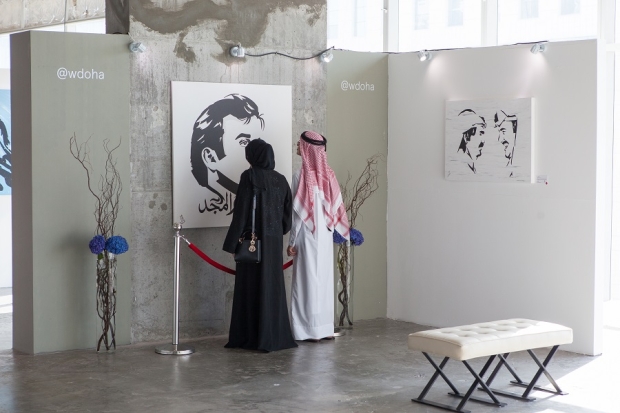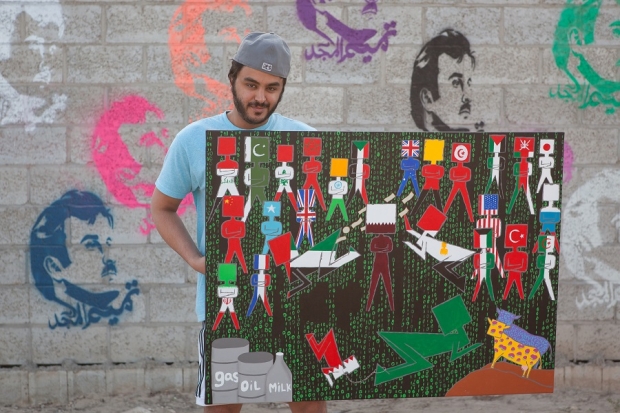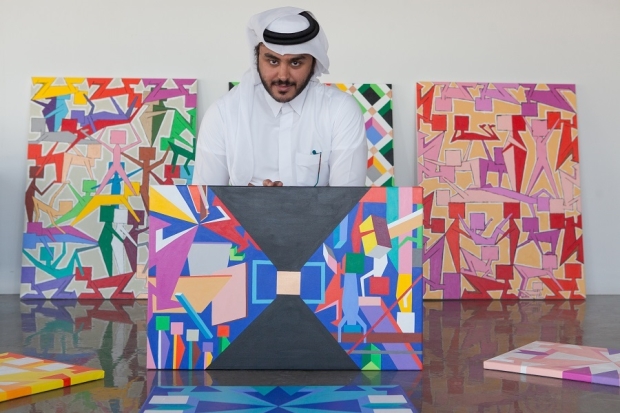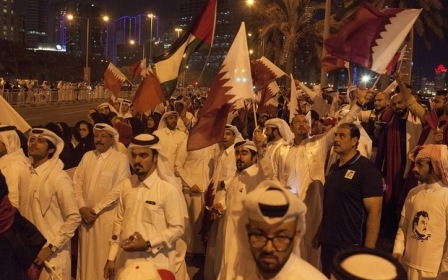Qatar's art of resistance: 'We do not attack or hurt, it's not in our culture'
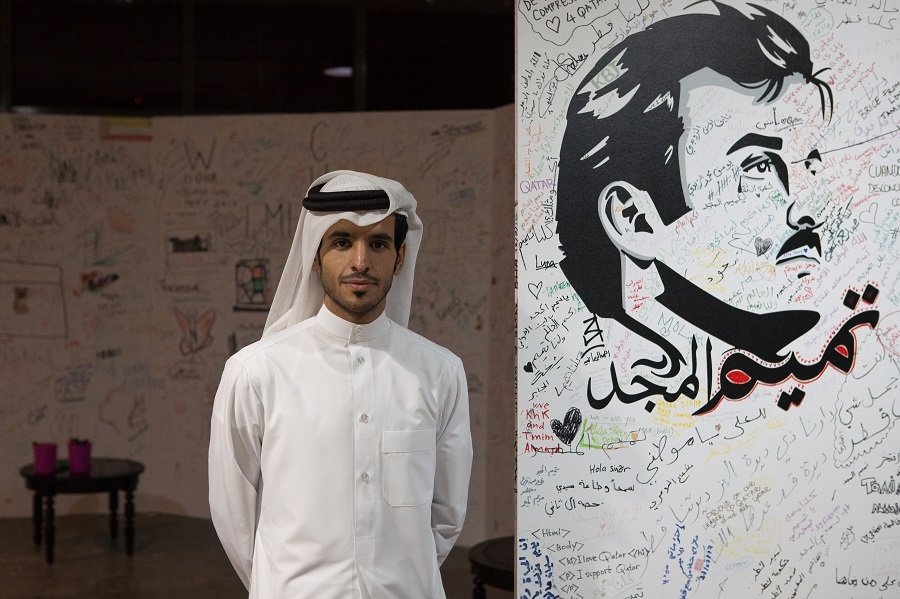
DOHA – It is hard to miss the famous portrait of Qatar's emir, Sheikh Tamim bin Hamad al-Thani, entitled Glorious Tamim, displayed on the facade of important buildings, five-star hotels and the latest sports cars on the streets of the country's capital Doha - the image is so popular, it even adorns T-shirts and flags.
Ahmed bin Majed al-Maadheed, the Qatari artist who drew the portrait, found it difficult to exhibit and sell his artwork before Glorious Tamim turned him into a national star overnight.
After the blockade, none of us have directly attacked our nearby countries. It is the Qatari way of thinking
-Khalifa al-Obaidly, art director
Al-Maadheed said that he had actually created the portrait to express support and admiration for the emir months before the blockade was imposed on Qatar in June by Saudi Arabia and the UAE. Egypt, Bahrain and other allies soon followed suit.
Stay informed with MEE's newsletters
Sign up to get the latest alerts, insights and analysis, starting with Turkey Unpacked
Qatar was accused by Saudi Arabia of supporting militant groups - including some backed by Iran - "that aim to destabilise the region". Qatar denied the allegations and said that the siege aimed to neuter an independent foreign policy that promoted peaceful regional reform.
On 5 June, al-Maadheed released the portrait on social media after news of the blockade was announced, and his artwork spread quickly in Qatar.
In one of al-Maadheed’s exhibitions held in a luxury hotel in the central business area of Doha's West Bay, paintings of camels, horses and falcons flying over Qatar’s skyline are displayed.
Beside them were portraits of the leaders who supported Qatar during the rift, including Sultan Qaboos of Oman, Turkey’s President Recep Tayyip Erdogan and Sheikh Sabah al-Ahmad al-Jaber al-Sabah of Kuwait.
"They are dignitaries of whom we are proud of. We aim to express our solidarity with them,” he told MEE. “When you paint someone, you express your admiration towards them. It is like that in Qatar.”
It was no surprise that portraits of the leaders of Saudi Arabia, the UAE and Bahrain were nowhere to be found.
"I would not make [portraits for them], and I would not be authorised to paint them,” he said without elaborating.
Al-Maadheed is one of many Qatari artists who sought the opportunity to spread their artwork and express support for Qatar and the emir.
“The blockade revealed many talents and personalities who wanted to express their love [for Qatar],” said artist Amna al-Darwish. “But I would say that their work is more nationalist than political.”
Freedom of expression
Mubarak al-Thani, a young Qatari artist, painted several men in cubic form, each one representing a country involved in the blockade. For example, Bahrain appears chained to Saudi Arabia, symbolising its submission to Saudi’s policies, according to al-Thani.
The 28-year old has also painted about other issues he is passionate about outside of Qatar’s borders, such as the wars in Yemen and Syria.
According to al-Thani, it is not very common for artists in Doha to tackle political issues or criticise negative aspects within Qatari society.
"We have things which need to change, it's true; especially in a society which develops as fast as ours,” he said. “But here, people paint what they like and they do that for leisure.”
[Freedom of expression] can be understood by some as a disorder to the public order
- Mubarak al-Thani, artist
Al-Thani’s paintings often depict people in colourful cubic forms similar to the shape of Doha’s skyscrapers. They represent the diversity of Qatari society and its fast development. Expats represent around 90 percent of Qatar’s population.
“I like the architecture in Doha and link their rectilinear lines to people,” he said.
Sometimes, the cubic figures in his paintings seem to take sexual positions. Al-Thani explained that he prefers to let people interpret his artwork as they prefer, rather than impose his vision on them.
“I have had no problem up to now," he added with a smile.
Al-Thani acknowledged that there are restrictions on freedom of expression in Qatar and not everything can be said in public.
Here, people paint what they like and they do that for leisure
-Mubarak al-Thani, artist
“[Freedom of expression] can be understood by some as a disorder to the public order,” al-Thani explained.
According to al-Thani, expressing opinions freely means that "socially speaking you’ll get attacked by the people [and] politically speaking you’ll get attacked by the government."
In March 2016, a Qatari poet was pardoned by the emir after serving more than three years of a 15-year prison sentence for reciting verses perceived to be critical of Qatar’s ruling family.
Charges against Rashid al-Ajami included “inciting the overthrow of the ruling regime”.
But al-Thani, a former employee of the United Nations Educational, Scientific and Cultural Organisation (UNESCO), believes that art can help push boundaries in the Arab world against restrictions imposed by societies and governments.
However, there are some lines many Qatari artists are not willing to cross.
Expressing opinions freely means that socially speaking you’ll get attacked by the people [and] politically speaking you’ll get attacked by the government."- Mubarak al-Thani, artist
"My personal red line would be not to create art depicting our country [in] a negative way. I prefer to deliver a positive message rather than to denounce,” said al-Darwish.
Al-Darwish painted a dove representing peace between the Gulf states. The image was used as part of a video in support of Qatar and its ruler, which was released in August.
'We do not attack'
Khalifa al-Obaidly, director of artists in residence at Doha’s Fire Station - a creative space for emerging artists to develop their talents - explains that Qataris prefer not to engage in negativity.
“Qataris are often too shy to express their feelings. After the blockade, none of us have directly attacked our nearby countries. It is the Qatari way of thinking. We prefer to support the oppressed."
Many Qatari artists were indeed cautious not to criticise neighbouring countries through their artwork following the Gulf crisis. Dana Mohammed is one of them.
My personal red line would be not to create art depicting our country [in] a negative way
- Amna al-Darwish, artist
"As Qataris, we consider that everything comes with dialogue and communication. Nothing comes out of attacks and if someone aggressively attacks you, you should not commit the same mistake," Mohammed told MEE.
The 24-year-old Qatari filmmaker produced a series of short films including archived images and quotes from former Gulf leaders speaking in several Gulf Cooperation Council (GCC) meetings. The cooperation body was founded in 1981. The quotes mostly include statements about the importance of unity between the Gulf states.
In one of the videos, the late Sheikh Zayed bin Sultan al-Nahyan, former UAE president, said:
"We must hope for greater solidarity and support for one another."
“The founding of the GCC came out of our mutual belief,” Mohammed said. ‘’We share one destiny.’’
Admitting the strong influence of Saudi Arabia over the region, Mohammed was wary of addressing the Gulf country in her artwork, even if it was done in a positive light.
“It was a risk to do something about Saudi Arabia, so I left it out,” she said.
Filmmaker Amal al-Muftah, produced House of Card: GCC Crisis, a short movie published on her Instagram account.
The opening scene closes in on a couple of hands covered in black gloves that are shuffling cards. Donald Trump’s quote is used as part of the voiceover: “Forming a new partnership to advance security across the Middle East.”
"My short movie was provoking but not aggressive," said al-Muftah. "The video has the same rhetoric as the American political series House of Cards, with gloves supposed to highlight those who instigated the blockade on Qatar." The political drama House of Cards is about a ruthless power couple operating in the United States government.
Her discomfort was evident as she spoke about what is considered to be a controversial political subject in Qatar.
"I asked myself many questions before doing this. I wondered how the community was going to perceive it. Would they see it as hate speech? Because tribes in the region have strong links with countries [included in the short film] and I did not want to shock them," she admitted.
The video ends with a quote from US State Department spokeswoman Heather Nauert questioning the motives of Saudi Arabia and the UAE for their political and economic boycott of Qatar: “The more time goes by, the more doubt is raised about the actions taken by Saudi Arabia and the UAE.”
This is then followed by a final question: "Running out of cards?"
Both al-Muftah and Mohammed said they received positive feedback on their short films.
“I did not want to do something based on hatred or anger. We do not attack and we do not hurt. It is not in our culture,” Mohammed said.
Middle East Eye delivers independent and unrivalled coverage and analysis of the Middle East, North Africa and beyond. To learn more about republishing this content and the associated fees, please fill out this form. More about MEE can be found here.


